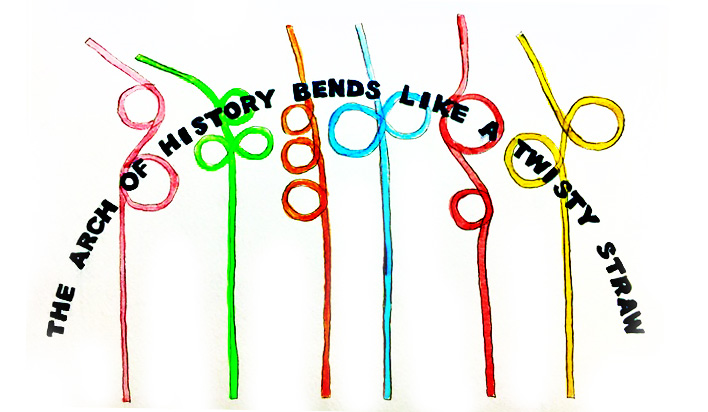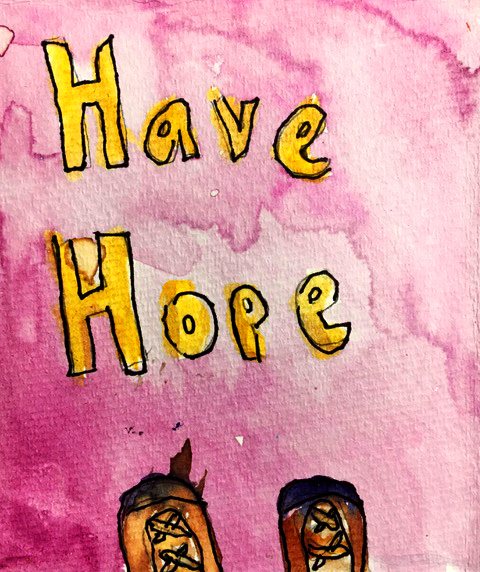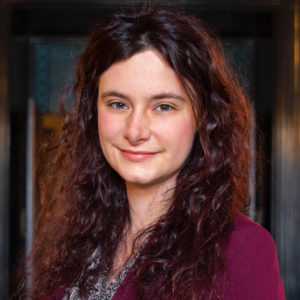“Do you think it helps to talk about it?”
I’m driving two of my housemates home from a gathering in the Rabbi’s backyard, where we sat next to a Sukkah decorated in dangling flowers.
I keep my eyes on the road as I consider the question. In my activist circles, the smartest, bravest people I know are scenario-planning for white supremacist militia violence and preparing to take to the streets to stop a fascist coup if necessary. On social media, I see some Jewish friends posting about wanting to have passports in order before November, a reminder of both our inherited trauma and our privilege. Winter is coming, and the deadly pandemic shows no sign of slowing down.
I say, “I worry about it all the time anyway, so I think hearing other people talk about it makes me feel less alone.”
All the young leftist Jews in my house feel anxiety about the looming election and its aftermath, but we don’t discuss it very often. After the presidential debates leave my stomach in knots, we make snacks and watch episodes of Avatar The Last Airbender as a palate cleanser.
It feels like the subtext of every conversation I have now is, since, you know, the world’s ending. No one wants to say that out loud, least of all me. If the organizer’s job is to make other people feel powerful, admitting I’m terrified feels too much like failure. What kind of hope can I offer right now, when I have no idea what the future holds?
***
In a recent Hey Alma piece called “Voice Notes of Hope,” Rabbi Steven Philp delivers a kind of pep talk for this political moment. He references the famous line from Hasidic master Rabbi Nachman of Bratslav: “The whole world is a narrow bridge, and the important thing is not to be afraid.” Rabbi Philp reminds us that we have survived difficult times before. He says, “We have walked the long arc of history and understand that it slowly bends towards justice.”
I’ve heard a lot of discussion about arcs of history and what they bend toward in my Reform Jewish and organizing communities. The quote is sometimes attributed to Dr. Martin Luther King Jr., but its actual origin is unclear. I once learned an “organizer’s stretch” to break up long meetings that ended with the words “The arc of the universe is long but it bennnnds towards justice,” accompanied by a backbend, arms outstretched in a curve.
I understand why the phrase is so popular. It’s a beautiful image, all of us marching together across a bridge bending eternally towards justice, with no twists or exit ramps.
***
I begin this year believing in history’s moral arch, and it bends toward Bernie Sanders. Politicians aren’t saviors, but Bernie represents a movement in my mind. We are the ascendant progressive future, fighting for a shared vision of climate justice and economic justice and racial justice and liberation for all people. And we’re on the brink of winning! First we’ll take the White House, and then we’ll take to the streets to secure a better world. I believe in this future so intensely I can taste it.
I leave my college town on weekends to canvas. I make jello cups for phone banks out of a friend’s apartment and double my weekly calling time when Bernie wins Nevada. Super Tuesday doesn’t go as well as we hoped, but that’s not the end of the world. Bernie can bounce back in Michigan. On the day of the Michigan primary, I skip all my classes to do turnout on campus. Students wait in line for hours to vote. I’m passing out pizza at a polling place to try to keep people in line when I hear the results start coming in. There are a few primaries left, but we know it’s over. The next day, the University of Michigan goes into COVID-19 lockdown. I never attend another in-person class as a college student.
The future bends into an unrecognizable shape. It feels like something precious has shattered, and I need to collect up all the fragments of hope I can get my hands on as quickly as possible.
***
Avatar the Last Airbender Season 2, Episode 12, from one child facing apocalypse to another: “You’re not letting yourself feel anything. I know sometimes it hurts more to hope and it hurts more to care, but you have to promise me that you won’t stop caring.”
***
In Hope in the Dark, Rebecca Solnit chronicles victories across a long history of movements for justice, and concludes that history works in non-linear ways. She says we like to imagine the future as a finality. We think we’ll march in a straight line until we end in complete destruction, when all hope is lost, or reach a utopia, when further struggle is unnecessary. But, “again and again, far stranger things happen than the end of the world.”
If we imagine winning only as the end of all injustice, it’s easy to despair. Perfection always seems out of reach. But then we overlook so many of our imperfect victories.
Sometimes winning looks like all the species that haven’t yet gone extinct thanks to hard-won environmental protections. It looks like all the forests that haven’t been poisoned with nuclear waste, which must now be protected from devastating fires. Winning looks like the indigenous people who continue fighting to preserve cultural traditions on sacred land, or the undocumented people raising beautiful children despite the threat of ICE raids, or the Black Lives Matter activists finding moments to dance in the street.
If history doesn’t have a moral arch or destination, there’s no such thing as a complete victory or absolute defeat. Nothing is inevitable. Rebecca Solnit’s view of history calls us to action, leaving no room for our despair. Basically, “Anything could happen, and whether we act or not has everything to do with it.”
***
I’m still scrambling for hope when social media fills with images of horrific police violence against Black people, and the COVID casualties pile up, and we learn ICE is sterilizing immigrants in its concentration camps, and the West coast catches fire, and it sinks in that Donald Trump will not accept the results of an election he doesn’t win. I find fragments in the staggering courage of Black activists leading us through the streets of Columbus, Ohio night after night to demand an end to racist violence.
The worst nights are the nights I stay home doing nothing. I scan grainy videos on Twitter obsessively, wondering, Do I know anyone in this crowd of people trapped against a wall in Seattle, choking on tear gas? A friend calls to ask me for jail support advice for someone last seen with blood running down his face. A friend calls to let me know they’ve just been released in the middle of the night. Uncertain how to comfort each other, we make fatalist jokes that produce grim and sickly laughter. I feel completely powerless.
***
A friend posts on Facebook, “Anyone feeling a sense of hope and possibility about the future? If so, where are you getting it from?”
“I know my friends won’t ever stop fighting for a better future, and if we’re placing bets my money’s on them winning.” I am not as certain as I want to seem.
An internet stranger replies, in a now-deleted comment, something like, “I don’t know if we’ll win everything, but I feel hopeful about the ways we’ll help each other survive. Like things might get really bad but at the end of the world maybe we’ll still be able to cook for each other.”
I repeat this theory to another organizer friend after Kyle Rittenhouse murders Black Lives Matter protesters in Kenosha. We talk about how bleak the future seems, and then sit in silence over the phone. I’m outside staring at the dark sky over my parents’ house. The stars are out.
I say, “At least, if things go really, really bad, like truly worst case scenario, our friends and the people in our communities are going to be the very last people to say ‘every man for himself.’ We’re going to be the last people to stop trying to take care of each other.”
He says, deadpan, “Wow, I’d love to meet whatever kind of friends you have sometime.” I crack up, a real laugh. It feels good.
***
The abolitionist and healer Tiffany Lenoi tells us, “Abolition is nonlinear… That’s why we’re able to be changing the present while living in the future now.” To create a world without prisons and police, we must build alternative structures to practice the kind of healing and accountability that we want for ourselves. The tradition of Black abolitionist imagination promises we can use our vision of a brighter future to guide the way we live today.
The mutual aid networks that cropped up across the country this year model this kind of “living in the future now.” We don’t have to wait for an end to the artificial scarcity and isolation of capitalism to start taking care of each other’s basic needs. We are practicing the communal responsibility and reciprocal loving-kindness of the future we long for.
Mutual aid networks and other radical forms of time travel make me hopeful because I see a kind of resilience in them. Like the Indigenous and Black traditions that created them, mutual aid networks remind us that we have everything we need to survive times of destruction.
They also remind us of what’s possible. Writer and educator Erica Meiners tells us, “Liberation under oppression is unthinkable by design.” Of course it’s difficult to imagine a world we haven’t seen before. The power structure of this world wants us to think it’s hopeless. In the right hands, imagination and hope are powerful weapons.
***
As the first Shabbat of quarantine draws to a close, my friend Miriam Saperstein meets me at a distance under the tree where we once foraged for plants to use in Jewish magic rituals. We’re both wearing masks, but I can look them in the eyes. We talk about the budding mutual aid network we’re working on and winning and hope, and I cry for the first time in weeks.
Miriam once taught me about the concept of a Shabbat Soul. Shabbat is a pocket of time detached from the constant work of creation and struggle that this world requires of us. On Shabbat, we acquire an additional piece of our soul as the Sabbath Queen descends upon the world, and temporarily live inside the world to come. Perhaps the world to come isn’t a future; perhaps it’s a form of time travel, or a place we can visit once a week.
We end up singing together under the trees, a song they wrote with another trans Jew:
“We may not know what’s coming, but Shabbat is coming soon again / We may not know what this week will bring / but I’ll dance with the Queen again / and you’ll dance with the Queen again / we’ll all dance with the Queen again.”
***
Rebecca Solnit says, “Hope is not a lottery ticket you can sit on the sofa and clutch, feeling lucky. It is an axe you break down doors with in an emergency.” (Lex Rofeberg, one of my mentors, once pointed out the similarity of the word “axe” to “acts” here).
We are living through an emergency and I need us to have hope. I don’t mean a passive, “I’m sure everything will work out okay” kind of hope. The arch of history bends like a twisty straw. Nothing is inevitable, and the future may be hard, and sometimes rage and grief are necessary. The hope I’m describing is a leap-of-faith conviction that a better future is possible, and worth fighting for.
Despair is easy. It requires nothing from us. If we have hope, if we believe we can shape a future still in the process of creation, we are obligated to act. Hope is the opposite of powerlessness.
At the end of the world, I tend baby plants and listen to stories from my Grandma, who says she’s “determined to be cheerful” every time I call her in quarantine. On Yom Kippur, my new housemates and I build a blanket fort and sit inside talking about police and prison abolition. Under a canopy of purple sheets, I find the hope I’ll need to mobilize to stop a coup instead of looking for safe places to flee.
I truly believe our communities have everything we need to meet this moment. We have the imagination of time travelers and the courage to build our own bridges to places we haven’t seen before. When we search for hope, we find it in the smell of garlic in the air before Shabbat dinner and in our songs and in each other’s eyes.



